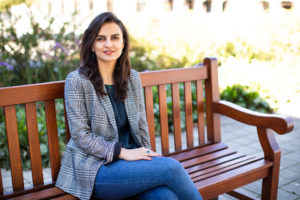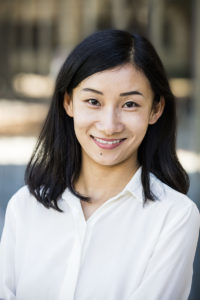People
Carl Wieman

Carl Wieman holds a joint appointment as Professor of Physics and of the Graduate School of Education at Stanford University. He has done extensive experimental research in both atomic physics and science education at the university level. Wieman served as founding chair of the Board of Science Education of the National Academy of Sciences and was the founder of PhET, which provides online interactive simulations that are used 100 million times per year to learn science. Wieman directed the science education initiatives at the Universities of Colorado and British Columbia, which carried out large scale change in teaching methods across university science departments. He served as Associate Director for Science in the Office of Science and Technology Policy in the White House from 2010-12. He has also studied student learning and problem solving and the comparative effectiveness of different methods for teaching science.
Argenta Price
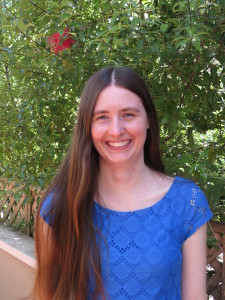
Argenta Price is a research associate, leading the HHMI adaptive expertise assessment project. She joined the Wieman group as a postdoc with the PhET interactive simulations project, where she researched how different ages of student learn from PhET simulations. Her current work on the HHMI project is to study adaptive expertise in problem solving among experts across a variety of science and engineering disciplines, identifying decisions that experts make in their problem-solving process. Based on the set of expert decisions, we are developing problems, in many topics, to measure how well courses and programs are preparing students to become expert-like problem solvers in their disciplines. Before joining the Wieman group, she received her PhD in biochemistry and molecular biology from the University of California, San Francisco. Publications can be found here.
Shima Salehi
Shima Salehi is an alumnus and a collaborator of Wieman research lab and a Research Assistant Professor at Stanford Graduate School of Education. She has a PhD in Learning Sciences, and PhD minor in Psychology, and a bachelor’s degree in electrical engineering. Her research focuses on how to teach STEM fields effectively and inclusively. In her PhD thesis, Salehi has developed a framework for teaching and assessing problem-solving practices to high school and under-graduate students. The framework has been adopted in a number of Science and Engineering courses at Stanford. Salehi also studies different causes, manifestations of inequities in STEM education and what instructional and institutional interventions can be designed to address these challenges. Since July 2020, she has started her position as a director of IDEAL research lab at GSE. The research mission of the lab is to design evidence-based practices to promote inclusivity, diversity, equity and access in learning communities at Stanford and beyond. Publications can be found here.
Jocelyn (Josie) Nardo
Jocelyn (Josie) Nardo Josie (she/her) is a postdoctoral scholar in the Graduate School of Education working with Dr. Shima Salehi (primary advisor) and Dr. Carl Wieman (secondary advisor) to understand how we can better support historically marginalized students in STEM. Her work focuses on two main projects: 1) “Understanding the Challenges of Historically Marginalized Students in STEM,” which is an interview-based project. If you are interested in participating in the study, please visit here: https://stanforduniversity.qualtrics.com/jfe/form/SV_9XBHmy0oWTtO3d4; 2) “Contextualizing Chemistry Active Learning Environments in Terms of Diversity, Equity, and Inclusion,” which involves working with faculty on instructional and institutional practices that promote student belonging, accessibility, and opportunities. Before joining the Wieman group, Josie received her PhD and MS in Chemistry at Purdue University within the division of chemical education, as well as received her BS in chemistry at Florida International University (FIU).
Josie (she/her) is a postdoctoral scholar in the Graduate School of Education working with Dr. Shima Salehi (primary advisor) and Dr. Carl Wieman (secondary advisor) to understand how we can better support historically marginalized students in STEM. Her work focuses on two main projects: 1) “Understanding the Challenges of Historically Marginalized Students in STEM,” which is an interview-based project. If you are interested in participating in the study, please visit here: https://stanforduniversity.qualtrics.com/jfe/form/SV_9XBHmy0oWTtO3d4; 2) “Contextualizing Chemistry Active Learning Environments in Terms of Diversity, Equity, and Inclusion,” which involves working with faculty on instructional and institutional practices that promote student belonging, accessibility, and opportunities. Before joining the Wieman group, Josie received her PhD and MS in Chemistry at Purdue University within the division of chemical education, as well as received her BS in chemistry at Florida International University (FIU).
Leonora (Lora) Kaldaras
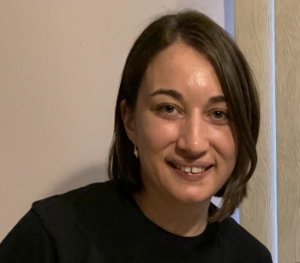 Leonora (Lora) Kaldaras is a research associate working with Dr. Wieman. She holds a PhD in Education from Michigan State University and a MS in Chemistry from Bowling Green State University. She specializes in designing learning environments and assessments to support students in developing deep understanding of big ideas in science. Her dissertation work focused on developing and validating learning progressions in the fields of Physical Science and Chemistry aligned to the Next Generation Science Standards (NGSS). Her research experience includes testing and validating machine learning (ML) approaches for automatic scoring of performance assessments in science. She has worked with teachers and students in a wide range of educational settings, including middle, high school and undergraduate gateway courses in science. She is a co-author of award-winning NGSS-aligned curriculum materials for high school called “Interactions”. Her research with Dr. Wieman focuses on developing interactive formative assessments for PhET simulations focused on studying student learning and designing strategies to support the development of conceptual understanding across scientific disciplines. Publications can be found here.
Leonora (Lora) Kaldaras is a research associate working with Dr. Wieman. She holds a PhD in Education from Michigan State University and a MS in Chemistry from Bowling Green State University. She specializes in designing learning environments and assessments to support students in developing deep understanding of big ideas in science. Her dissertation work focused on developing and validating learning progressions in the fields of Physical Science and Chemistry aligned to the Next Generation Science Standards (NGSS). Her research experience includes testing and validating machine learning (ML) approaches for automatic scoring of performance assessments in science. She has worked with teachers and students in a wide range of educational settings, including middle, high school and undergraduate gateway courses in science. She is a co-author of award-winning NGSS-aligned curriculum materials for high school called “Interactions”. Her research with Dr. Wieman focuses on developing interactive formative assessments for PhET simulations focused on studying student learning and designing strategies to support the development of conceptual understanding across scientific disciplines. Publications can be found here.
Karen Wang
Karen Wang is a Ph.D. candidate at the Stanford Graduate School of Education. Under the guidance of Professor Carl Wieman, her research focuses on defining, measuring and teaching complex problem-solving skills using data-enriched assessments and learning analytics techniques. Karen is deeply passionate about leveraging technology to help children of all capabilities engage in learning. Previously, she worked as a technology teacher in the nation’s first Chinese-English bilingual immersion school in San Francisco and a distance educator at the Johns Hopkins Center for Talented Youth in Baltimore. She holds a BA in College of Social Studies and Economics from Wesleyan University and an MA in Learning, Design and Technology from Stanford University.
Fred Krynen
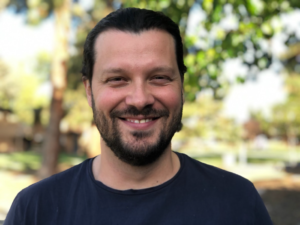 Fred Krynen is a Ph.D. student in Mechanical Engineering at Stanford University. Under the guidance of Professor Carl Wieman and Professor Shima Salehi, his research focuses on teaching methods as they apply to introductory university-level mechanical design courses. He is focused on measuring these methods’ impact on performance, retention and on the students’ sense of belonging in the physical space they occupy while learning, and in the field of engineering. Previously, he worked as a Chef for eleven years in fine dining restaurants in five countries. In 2014, he returned to school to earn his GED, attended Mt Hood Community College in Gresham, Oregon and transferred to Stanford University in 2016. He holds a BS and a MS, both in Mechanical Engineering from Stanford University.
Fred Krynen is a Ph.D. student in Mechanical Engineering at Stanford University. Under the guidance of Professor Carl Wieman and Professor Shima Salehi, his research focuses on teaching methods as they apply to introductory university-level mechanical design courses. He is focused on measuring these methods’ impact on performance, retention and on the students’ sense of belonging in the physical space they occupy while learning, and in the field of engineering. Previously, he worked as a Chef for eleven years in fine dining restaurants in five countries. In 2014, he returned to school to earn his GED, attended Mt Hood Community College in Gresham, Oregon and transferred to Stanford University in 2016. He holds a BS and a MS, both in Mechanical Engineering from Stanford University.
Collaborators
AAA Lab
We also collaborate extensively with the AAA Lab in the Graduate School of Education at Stanford University (PI: Prof. Dan Schwartz).
